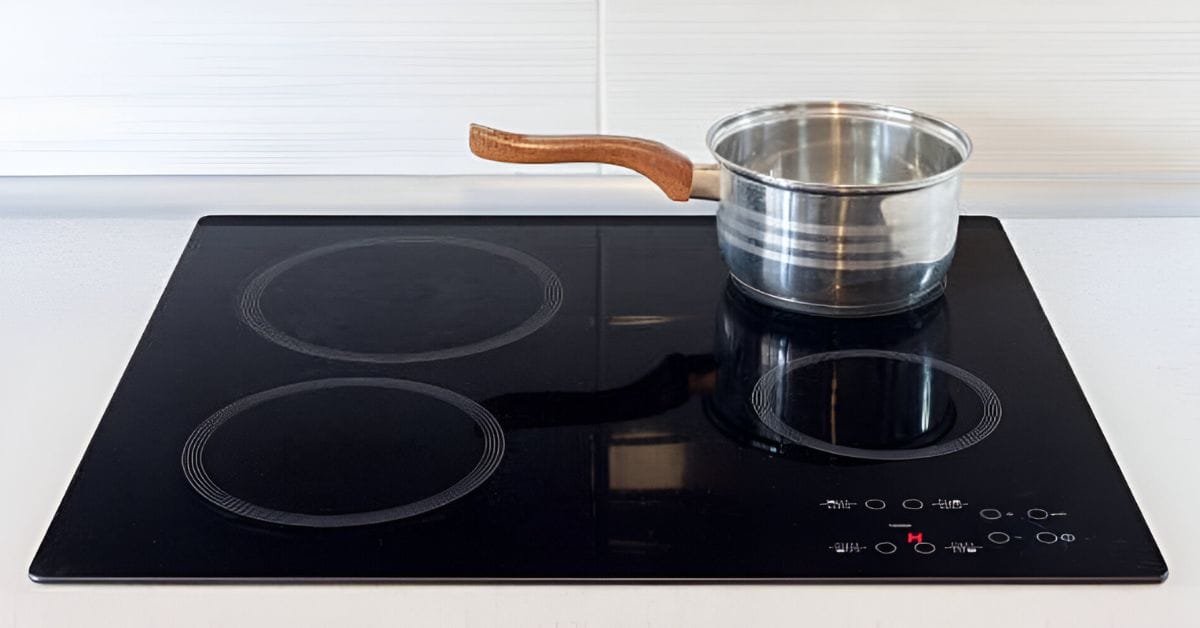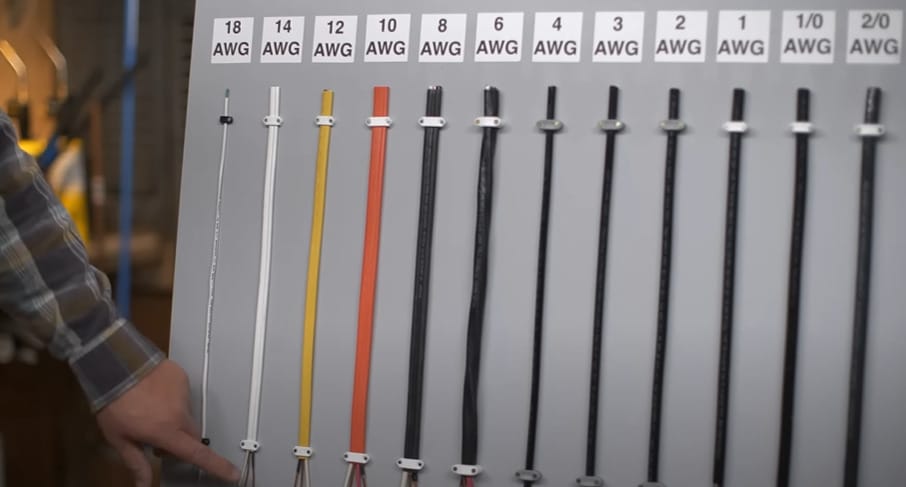What Size Wire for Electric Stove (Guide)

When you’re dealing with those big, power-hungry appliances like your electric stove, picking the right wiring is crucial. These beasts are real power eaters, often chowing down thousands of watts like it’s nothing.
For a 50-amp electric stove running on 240v, go for a strong 6 AWG wire. If your stove needs 40 amps or less, an 8 or higher AWG wire is sufficient. A wire this size ensures all that electricity can flow through without turning your wiring into a hot mess.
In this article, we delve into the essentials of electric stove wiring, from their energy demands to choosing the appropriate wire for their power needs. Get ready to amp up your knowledge of electric stove wiring!
Making a Choice Between Different Wire Sizes
Let’s get down to the nitty-gritty of picking the right wire size for your electric stove, and trust me; it’s as important as choosing the right size beam for a load-bearing wall in your house.

We use the American Wire Gauge (AWG) system, which measures the diameter of those wires. Now, here’s the quirky part – the smaller the number in the AWG system, the bigger the wire. It’s like how the smaller the number on a drill bit, the larger the hole it makes.
| AWG Size | Diameter (inches) |
|---|---|
| 1 | 0.2893 |
| 2 | 0.2576 |
| 4 | 0.2043 |
| 6 | 0.1620 |
| 8 | 0.1285 |
| 10 | 0.1019 |
| 12 | 0.0808 |
| 14 | 0.0641 |
| 16 | 0.0508 |
For your regular appliances that run on 120v, like maybe a toaster or a coffee maker, you’re considering using a 14 to 12-gauge wire. But when we’re talking about the big guns, like your electric stove that needs 240v, you’ll need at least a 10 gauge wire.
So there you have it – your quick guide to wire sizes for that powerhouse in your kitchen. Remember, picking the right size is crucial, just like ensuring your foundation is solid before you start building up. Happy wiring!
What AWG Wire Can Take on a Load of 50 Amps?
Now, for the big question – what size wire do you need for a stove that demands 50 amps of power? It’s a bit like making sure you’ve got a strong enough support beam for a heavy load.

For a 50-amp stove, especially if we’re talking 240v electricity, you will want a 6 AWG wire. This wire is the muscle you need for heavy lifting.
But, if your stove is a bit less demanding, maybe 40 amps or less, an 8 AWG wire could do the trick. It’s all about ensuring you have the power capacity you need.
Always remember to do your homework on your stove’s requirements before picking your wire size – it’s like measuring twice before cutting once in a build.
Wire Size Comparison Chart
Let’s put together a comparison chart to understand wire sizes, their capacities, and the appliances they’re best for. This time, it’s all about getting our wires straight.
| Wire Size (AWG) | Capacity (Amps) | Best Suited For | My Take |
|---|---|---|---|
| 14 AWG | Up to 15 Amps | Light fixtures, lamps, small appliances | Perfect for those small jobs, like adding a new lamp or powering a blender. |
| 12 AWG | 15-20 Amps | Outlets, mid-range appliances | The go-to for most of your standard outlets. |
| 10 AWG | 20-30 Amps | Large appliances, electric stoves, heavy-duty tools | Now we’re talking power! Ideal for your big players like electric stoves. |
| 8 AWG | 35-40 Amps | Large heating appliances, residential air conditioners | For when you need a little more power, like running that AC unit. |
| 6 AWG | 50-60 Amps | Large central air conditioning units, electric furnaces | This is your heavy-duty wire, like using a sledgehammer for big demolition jobs. |
Remember, choosing the right wire size is like picking the right tool for a job – you have to match it to the task at hand for safety and efficiency.
Staying Current with Electrical Codes: Wiring Your Electric Stove Safely and Legally
Now, I always say that staying current with electrical codes is like keeping your toolbox updated – you’ve got to have the right tools for the job. The National Electrical Code (NEC) is your go-to guide here.
As of my latest check-in, there are a few key things to keep in mind for your stove wiring:
- Wire Size and Circuit Breakers: The NEC specifies the wire sizes for different amperages. For instance, you’re looking at a 40 to 50-amp circuit for most electric stoves. That means you’ll need 8 AWG for 40 amps and 6 AWG for 50 amps. It’s like picking the right size beam for the weight it needs to support.
- Outlet Requirements: Your electric stove typically requires a 240-volt outlet. It’s not your standard plug; This is built to handle more power.
- Grounding and Bonding: Super important for safety. The NEC requires proper grounding and bonding for all electrical installations. This is like the safety harness when working up high – a real lifesaver.
- Local Codes and Permits: Always check your local building codes, too. They can have additional requirements or variations from the NEC. Knowing the local rules before starting a neighborhood construction project is like knowing the local rules.
Remember, these codes can be updated every few years. So, staying informed is essential to keep your skills sharp. When in doubt, consulting with a licensed electrician is like calling in a seasoned pro to help with a tricky part of your project.
Electric Stove Maintenance: Keeping Your Wiring and Components in Top Shape
Let’s discuss keeping your electric stove’s wiring and components in tip-top shape.
- Regular Inspections Are Key: Just like you’d check the roof for leaks, regularly inspect the wiring of your electric stove. Look for wear and tear, fraying, or loose connections. Catching these early is like stopping a small leak before it becomes a flood.
- Keep It Clean: How does a clean workspace improve everything? The same goes for your stove. Keep the area around your stove, especially where the wiring is, free from grease and debris. A buildup can cause overheating.
- Tighten Connections: Over time, connections can loosen – it’s like screws in a well-used cabinet. Periodically check and tighten electrical connections, but make sure the power is off first! Safety comes first, always.
- Avoid Overloading: Just like you wouldn’t overload a paintbrush with too much paint, don’t overload circuits with too many appliances. This can strain your stove’s wiring and increase the risk of issues.
- Professional Check-Ups: Now and then, bring in a pro for a thorough inspection. They can spot things you might miss and ensure everything is up to code.
- Upgrade If Necessary: Consider upgrading the wiring and components if your stove is old.
- Be Mindful of Usage: Lastly, be mindful of your stove use. Avoid using it for extended periods at its highest setting. It’s like not constantly pushing a power tool to its limit – it prolongs its life.
Remember, maintenance is all about prevention. Remember these tips, and your electric stove will be a reliable kitchen companion for years!
Frequently Asked Questions
- Can I Use the Same Wiring for My New Electric Stove?
- If you’re swapping out your old stove for a new one, checking if the existing wiring matches your new stove’s requirements is crucial.
- Is It Possible to Retrofit the Wiring for an Older Electric Stove Model?
- Retrofitting can be done, but it’s like renovating an old house. You must ensure the new wiring complies with current safety standards and meets the appliance’s requirements.
- Can I Install or Upgrade My Electric Stove Wiring Myself?
- DIY is great, but I always recommend calling in a pro for electrical work, especially for high-power appliances like an electric stove.
- What Should I Do if My Electric Stove Keeps Tripping the Circuit Breaker?
- If your stove trips the breaker, it’s a sign that the circuit is overloaded. It’s like putting too much weight on a shelf – balancing the load or strengthening the support.
- Can Different Brands of Electric Stoves Affect Wiring Choices?
- Yes, different brands might have varying power requirements. It’s like picking the right type of paint for different materials – you need to match the product to the job.
References
Organizations:
- National Fire Protection Association (NFPA). https://www.nfpa.org/en
- Underwriters Laboratories (UL). https://www.ul.com/solutions
Books:
- “Wiring a House” by Rex Cauldwell. https://www.barnesandnoble.com/w/wiring-a-house-rex-cauldwell/1118175264
- “Black & Decker The Complete Guide to Wiring” https://www.barnesandnoble.com/w/black-decker-the-complete-guide-to-wiring-updated-8th-edition-cool-springs-press/1141325337
- “Electrical Wiring Residential” by Ray C. Mullin and Phil Simmons. https://www.barnesandnoble.com/w/electrical-wiring-residential-ray-c-mullin/1116778103
Website Resources:
- Energy Star. https://www.energystar.gov/
- This Old House. https://www.thisoldhouse.com/
- DoItYourself.com. https://www.doityourself.com/
Video References:
Ask-The Electrician
This Old House
